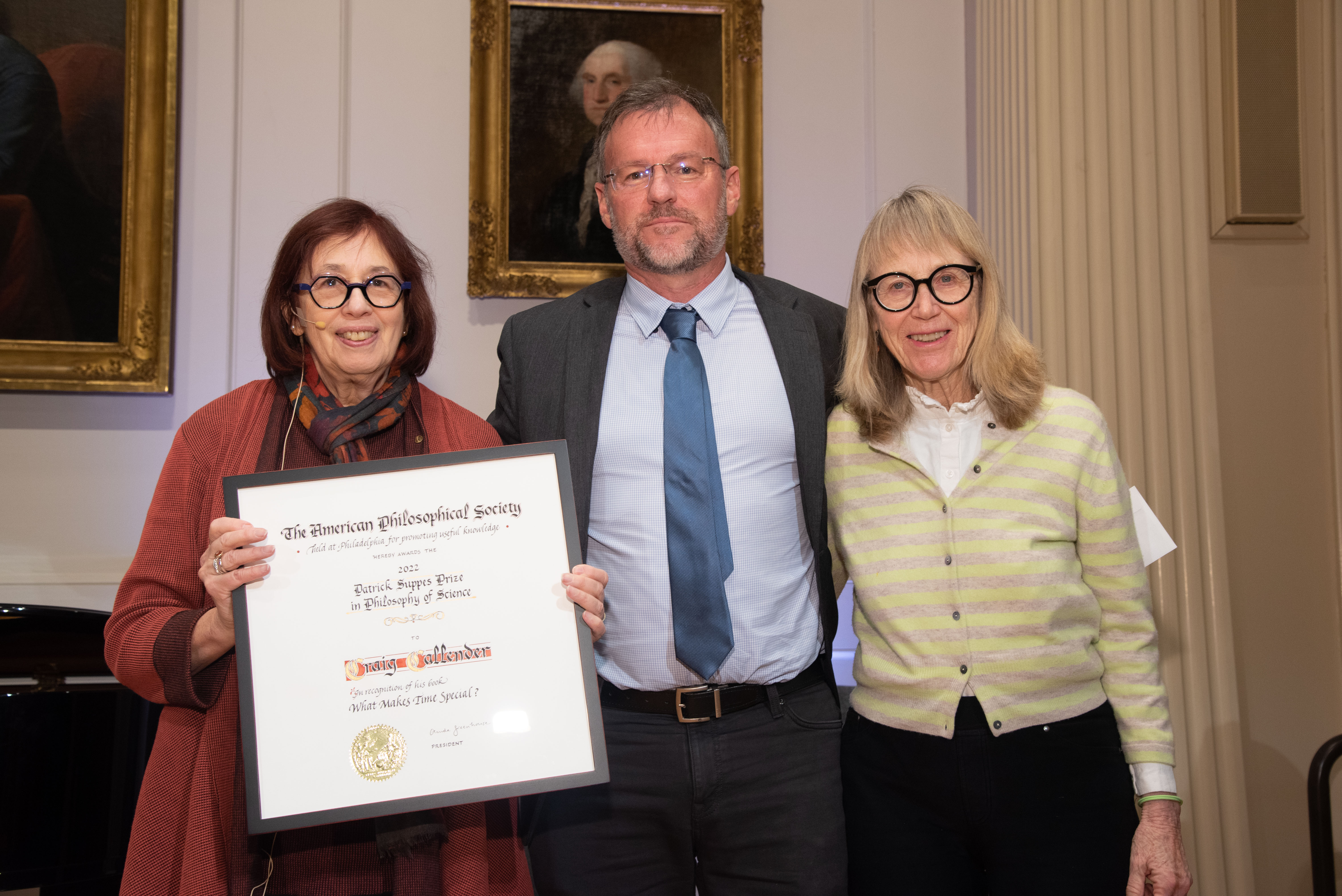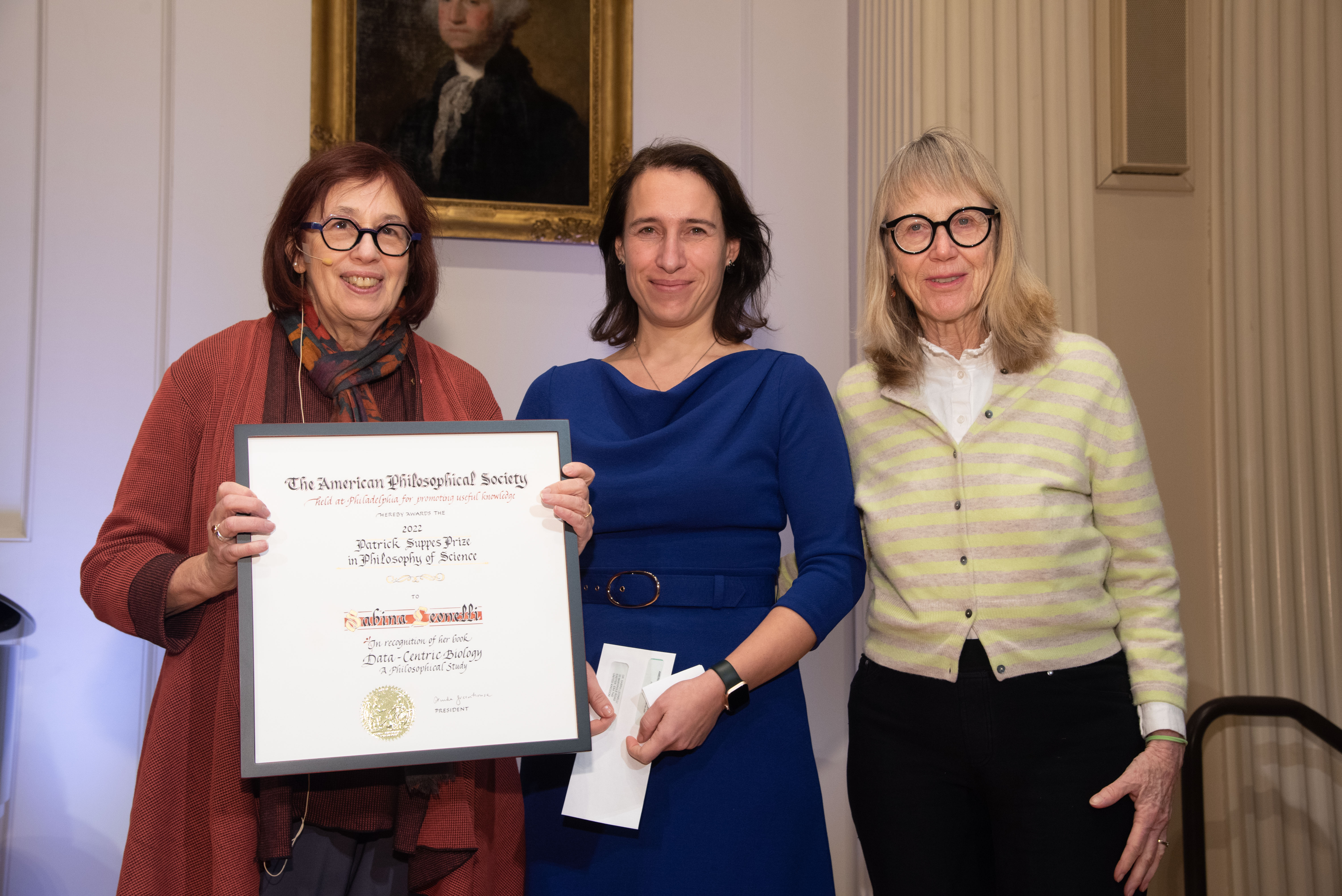2022 Patrick Suppes Prize in Philosophy of Science
The 2022 Patrick Suppes Prize in the Philosophy of Science will be split between two equally deserving recipients, Craig Callender for What Makes Time Special and Sabina Leonelli for Data-Centric Biology. The 2022 Suppes Prize was presented at the Society's November 2022 Meeting.

Craig Callender: What Makes Time Special?
This book is an ambitious and original exploration of the question in the title, involving an in-depth account of the understanding of time in both contemporary physics and contemporary psychology. It addresses a fundamental challenge to physics’ claim to tell us what the physical universe is really like: physics does not seem able to accommodate time as we encounter it in everyday life, with its special sense of ‘now’, the asymmetry of past and future, and our sense of the flow of time. Yet it seems pure scientific hubris to dismiss our experience of time as chimerical on account of our favourite theories in physics.
The book provides a masterful survey of the role of time in Newtonian gravitation, relativity theory, quantum mechanics, and quantum gravity, concluding that none find an easy place for time as we know it, with relativity and quantum gravity positively inimical to it.
Then the book deploys insights from biology, cognitive science and psychology to construct a brilliant reconciliation. Our model of time as we experience it is forged by our minds to deal with the perceptual and evolutionary problems thrown at it. Time can be as physics portrays but we misrepresent if for very good reason. This way of saving both views at once is well grounded in the science and is compellingly argued. The Suppes Prize Committee congratulates the book for opening serious new inroads on a classic problem that philosophy has long struggled with.

Sabina Leonelli: Data-Centric Biology
Sabina Leonelli recognizes the ways in which the abilities to accumulate, preserve, and distribute massive amounts of data are changing many scientific fields. Her ground-breaking study attends to the philosophical issues raised by this important trend. Focusing on biology, she shows how big data modifies orthodox ideas about experiment and theory, and she addresses the new philosophical questions it raises. The Suppes Prize Committee sees Data-Centric Biology as a pioneering book that opens up a major new area of science for philosophical discussion.
The possibility of amassing and storing huge amounts of data invites researchers to perform exploratory experiments, and shifts emphasis from theory construction to practical goals. When data become broadly shared, new norms arise: withholding data is sinful. As Leonelli shows, the concept of data evolves. Data are relative to goals, since they must be stored – “packaged” – to aid particular research questions.
This requires a new style of scientific work. Databases require “curating” to enable investigators around the globe to find information potentially relevant to their projects. Leonelli explores the challenges facing those who assume this novel role.
As she notes, one of the few previous philosophers to take an interest in the production of data was Patrick Suppes. Her rich account may be seen as the flowering of a seed that he once planted. The committee regards her book, not as the last word on its topic, but as one that will inspire and shape an important subfield in the philosophy of science.
The Patrick Suppes Prize honors accomplishments in three deeply significant scholarly fields, with the prize rotating each year between philosophy of science, psychology or neuroscience, and history of science. The Patrick Suppes Prize in the Philosophy of Science is awarded for an outstanding book in philosophy of science appearing within the preceding six years.
The committee members were Nancy Cartwright (chair), Distinguished Professor, University of California, San Diego, Professor of Philosophy and co-director of CHESS, Durham University; Lorraine Daston, Professor, Director, Max Planck Institute for the History of Science, Visiting Professor of Social Thought and History, Committee on Social Thought, University of Chicago; Philip Kitcher, John Dewey Professor of Philosophy, Columbia University; and Stephen Stigler, Ernest DeWitt Burton Distinguished Service Professor, University of Chicago.
